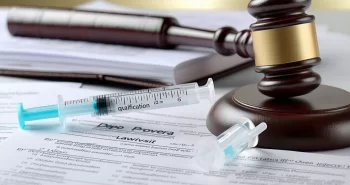Depo Provera Weight Gain Allegations in Lawsuits

Does Depo Provera cause weight gain has become a legal issue for patients who report significant weight changes after using the injection. Lawsuits allege the manufacturer failed to properly warn about the severity and likelihood of weight gain. These claims focus on product liability and failure to warn, not medical advice. This page explains when Depo Provera weight gain complaints may qualify for legal action.
Table of Contents:
Patient Weight Gain Complaints Reported in Claims
Trying to piece together how Depo-Provera affects weight gain? Let’s take a moment to hear from those who’ve been there and done that. Weight gain pops up as a side effect on the Depo label, but it doesn’t hit everyone the same way.
The folks over at Cleveland Clinic say, on average, users might pack on around five pounds after using this shot for a year. But here’s the kicker—not everyone notices a change on the scale. Anything from your age and starting weight to those quirky metabolic quirks can tip the scales.
Hop over to PubMed Central, and you’ll find research noting an average gain of about 2.40kg for women on Depo-medroxyprogesterone (DMPA). Factors include how old you are when you first get that shot, no matter your starting size. Plus, those in different BMI groups might see varied outcomes: some folks, especially those starting off underweight, might gain while others, particularly in the Class I obese category, could actually drop weight.
Digging more into this, studies from PMC show roughly a quarter of users might notice pounds creeping on early, with some seeing faster gains than others down the track. This is good to know when weighing your birth control options.
Bottom line? Everybody’s journey with Depo-Provera and weight is its own story, with starting points and timing playing big roles. Thinking of hopping on the Depo-Provera train? It’s definitely worth sitting down with your doc to chat about what suits you best. If weight gain is a lingering worry or if you’re having a rough time with the shot, grabbing some medical advice sooner rather than later is key.
Studies Cited in Depo Provera Weight Gain Litigation
Clinical research has definitely highlighted the link between Depo-Provera and weight gain. Since 2009, studies have shown a strong connection between using Depo-Provera (DMPA) and putting on some extra pounds. According to Verywell Health, women on Depo-Provera might notice changes in their weight, from a little to a whole clothing size or more. Compared to other contraceptives like the pill or an intrauterine device (IUD), this one seems to pack on the pounds more.
The research points out that the weight gain is mainly due to an increase in body fat. Many users have shared concerns over changing body shapes while using Depo-Provera.
Users usually see an average 5-pound increase in the first year on Depo-Provera, as the Cleveland Clinic mentions. However, everyone’s body reacts differently, and some might see more changes than others.
Moreover, troubling longer-term side effects have been identified. A study in The British Medical Journal, cited by Drugwatch, found long-term use of Depo-Provera increases the risk of meningiomas, which are tumors in the brain’s protective lining, by over five times. This highlights the need for careful consideration and regular monitoring when picking birth control methods to dodge any sneaky health risks.
Understanding these findings is super important for anyone thinking about, or already using, Depo-Provera. It helps users make smart choices about their birth control based on their personal health goals. If you’re noticing weight gain or other bothersome side effects with Depo-Provera, chatting with a healthcare provider to explore other birth control options better suited for you is a good move.
Manufacturer Knowledge Allegations About Weight Gain
So, let’s chat about how those tiny contraceptive pills (especially Depo-Provera) can leave a bigger mark on your waistline. These birth control methods come with synthetic hormones, sorta like what your body naturally produces. They play around with your metabolism and fat storage, which sometimes leads to a few extra pounds for some of us.
Hormones and Your Metabolism
Ever had a day when you’re sure your body’s fighting you on how it handles food and energy? When you’re on hormonal birth control, that’s basically what’s happening. The effects can vary—some folks might gain a bit of weight, others might not notice a thing. It’s like the body’s own way of rolling the dice.
Fat Plays Musical Chairs
With hormonal birth control like Depo-Provera, it’s not just about gaining weight but also about where the fat wants to hang out. Studies have made it clear: there’s usually a build-up of visceral fat—yep, the kind snuggled around your organs. It’s not the friendly kind of fat either; it likes raising the risk of stuff like heart disease, strokes, and diabetes (News-Medical).
What Studies Say About Weight Gain
Research has a thing or two to say about hormonal contraceptives and weight gain. According to a 2020 study, women on Depo-Provera ended up with around 5.3 extra pounds after a little over three years, largely owed to more visceral fat (Verywell Health). Not everyone turns into a statistic with these pounds, but it’s something worth keeping an eye on.
Weighing Visceral Fat and Health Blues
Packing on visceral fat isn’t merely a cosmetic concern. Along with contributing to weight gain, it amps up the odds of some pretty serious health issues like heart troubles, strokes, and diabetes. If birth control’s on your agenda, grasping how it juggles fat in your body is pretty critical.
Being aware of how hormonal birth control messes with metabolism, fat distribution, and weight is power. It lets you make smarter decisions about your birth control choices. Always good to have a chat with your healthcare provider about this and unexpected weight twists—they’ll help you figure out what’s best for your health journey, and look for alternatives with less baggage tagged “weight gain.”
Weight Gain Claims Despite Lifestyle Factors
So, you’ve decided to go the healthy route, munching on kale salad and doing those extra sets at the gym. But then, you step on the scale and what?? It’s harder to believe than a unicorn sighting, but your weight’s up! If you’re using Depo-Provera, it might not seem so strange. Even with all those good habits, some folks see the scale creeping up.
According to a peek over the pond in Europe, folks doing all the “right” things still packed on an average of 4.4 pounds over a year with Depo-Provera hanging out in their systems. On top of that, there was this sneaky 2.2% jump in body fat. Kinda makes you wonder if Depo-Provera’s got a sly agenda against salads and jogging.
Now, don’t toss those veggies out the window just yet. Even with some good old-fashioned counseling about munching right and living well, users still experienced a few surprise pounds. This weight gain isn’t one-size-fits-all. It tends to favor growing in the belly area, which can make you feel like you’ve been munching on donuts every meal – without the pleasure, mind you.
And then there’s the timing. Early gains, especially within the first half-year of sticking Depo-Provera into your routine, can wave red flags about additional pounds down the road. Some folks have tried switching lanes to non-hormonal birth control and seen those extra pounds edge away. But it still doesn’t hurt to keep that exercise in check and sneak veggies into everything.
The big star here? Chatting it up with your docs. They’re like the guidance counselors in the rollercoaster ride of weight management on Depo-Provera. Personal advice could be what you need to stay on track with your weight and health goals. Everyone’s body sings to its tune, so make sure your doc’s part of your band to tackle any weighty issues.
Onset Timing Referenced in Legal Claims
When it comes to putting on extra pounds after starting Depo Provera, the scale can tip early for some folks. Researchers have found that if you notice a boost in weight—say more than 5% of what you already weigh—within the first six months or after just two shots, chances are the trend might continue (News-Medical).
Take, for instance, a study that ran for three years showing that popping on the pounds early—specifically, a 5% bump in your weight during the first half-year on Depo—hints at more weight piling on later. Folks with this quick start on weight gain tipped the scales at an extra 0.78 pounds each month, unlike their peers who gained just 0.18 pounds monthly (Verywell Health).
About a quarter of people using Depo notice this early uptick. These early birds saw numbers rise at 12, 24, and 36 months faster than those with less dramatic beginnings. Early gainers saw the scale go up by 7.03 kg more over those three years compared to regular gainers. These folks experienced a noticeable boost at 0.35 kg each month, while the slower risers clocked in at 0.08 kg monthly (PMC).
So what’s the takeaway? If your weight starts to creep up soon after getting the Depo shot, it might be time to chat with a healthcare pro about it. Keeping an eye on these changes can help handle anything the Depo throws your way, including those extra pounds. It’s always better to be safe and tackle issues head-on.
Reported Weight Gain Amounts in Claims
When you’re thinking about how Depo-Provera might affect your weight, it’s good to know what changes people usually notice. Studies have tried to answer this question, helping to show why some people might experience weight changes with Depo-Provera.
One study discussed in PubMed Central found that women who use Depo-Medroxyprogesterone (DMPA) gain about 2.40 kg on average. This weight gain seems related to how old they are when they start the injection, and it doesn’t matter what their Body Mass Index (BMI) is initially. Also, many noticed changes in how they bleed during their periods, with amenorrhea being quite common.
In another study from Verywell Health, women using Depo-Provera put on about 5.3 pounds after using it for 42 months. This weight seemed to pile up mostly as belly fat, suggesting that Depo-Provera might change where your body stores fat.
Why exactly people gain weight with Depo-Provera isn’t fully clear yet. Some scientists think it might be because of hormonal changes or how the steroid in Depot Medroxyprogesterone Acetate (DMPA) affects the body, as talked about by Verywell Health. Especially, if you start noticing weight gain shortly after starting Depo-Provera, you might see even more as time goes by.
There’s another aspect worth mentioning—Depo-Provera lowers estrogen levels significantly, which might lead to weight issues. Based on research from News-Medical, using estradiol with DMPA could help with this and other concerns like depression, lower sex drive, and spotting.
Contrary to what many people think, most birth control options don’t make you gain weight. Changes in weight with birth control are often due to things like water retention or getting older, noted by GoodRx.
Knowing more about how Depo-Provera might change your weight is useful if you’re currently using it or thinking about it. Healthcare professionals can provide advice, and understanding side effects lets you make better choices about your reproductive health.
Medical Documentation Used in Weight Gain Claims
Before you decide to keep rolling with Depo-Provera as your go-to for birth control, it’s a good idea to have a real talk with your doctor. Here are some things you’ll want to cover:
- The Weight Thing: Let your doc know if you’re worried about adding a few pounds on Depo-Provera. Some folks might pack on about 5 pounds in a year, says the Cleveland Clinic, so it’s wise to get clued up on what might come and how to handle it.
- Your Health Tale: Make sure you spill all the beans about your health history, like any ongoing conditions or potential risks. If cancers like breast or cervical have ever been in the picture, mentioning that is key since Depo-Provera could up the stakes (Drugwatch).
- The Not-So-Fun Effects: Ask about possible side effects of Depo-Provera. While weight is often the headline, issues like bone thinning, allergic flare-ups, or blood clots can also step on stage, meaning other birth control might suit better (Drugwatch).
- Personal Risk Factors: Find out what specific risks could change how your body jives with Depo-Provera. Things like a BMI under 30 or getting extra hungry afterward might mean bigger weight changes, as News-Medical reports.
- Mixing With Existing Conditions: If you’ve got other health stuff going on, chat about how Depo-Provera might shake things up. Folks starting Depot Medroxyprogesterone Acetate (DMPA) with a backdrop of obesity have seen different weight stories (Verywell Health).
- Other Fish in the Sea: Check out what other birth control options are out there with possibly fewer weight worries or better-suited side effects. Your doctor can lay out the menu and help pick the one that matches your health aspirations.
- Considering Supplements: Should you ask about adding estradiol when on DMPA? According to News-Medical, it might put the brakes on weight issues, low mood, and vanishing libido.
Discussing these points with your doctor helps keep things transparent and steer your birth control choices confidently. Keeping this conversation open goes a long way to make sure all aspects of your health stay top of mind when considering how Depo-Provera fits into your life.
Product Comparison Arguments Raised in Lawsuits
Looking at different contraceptives, it’s always a good idea to know what each one might bring to the table, especially when it comes to stuff like gaining weight. Some folks find that Depo-Provera, though effective, isn’t quite in sync with their body goals. If you’re concerned about this, exploring other options that are kinder on the waistline could be your next move.
Investigating Alternatives
While Depo-Provera gets the job done, it’s not everyone’s cup of tea due to side effects like weight creep. If you’re thinking it’s time for a switch to something that lets you keep your weight in check, your healthcare provider should be your first stop. They can suggest options more in tune with your needs and wants.
Considering Hormonal vs. Non-Hormonal Options
There are choices beyond hormone-driven methods like Depo-Provera. Non-hormonal picks such as condoms, diaphragms, or a trusty copper IUD keep things simple by blocking sperm from finding an egg, all without tossing extra hormones into the mix. These could be great for those looking to dodge hormone-related side effects like weight gain.
Exploring Low-Dose Hormonal Options
Should you lean towards hormonal birth control but fret about packing on pounds, consider the low-dose route with pills or hormonal IUDs. These carry fewer hormones than Depo-Provera shots, potentially lowering the weight gain risk while still guarding against pregnancy effectively.
Discussing Individual Health Considerations
A heart-to-heart with your healthcare provider about your health, day-to-day life, and what you want from your birth control can make a world of difference. They’ll help you sift through your risks and pick a contraceptive that clicks with your health goals and takes your worries into account.
Taking a good look at different options with an eye on keeping weight in check can lead to smarter decisions about your reproductive health. Keep that convo going with your healthcare professional to nail down a birth control method that complements your lifestyle. Consider the pros and cons of each to discover what fits just right for you.
Sure, here’s the revised content:
Can You Get Compensation for Weight Gain Damages?
Ever grappled with the frustrating side effects of a Depo Provera shot? You might be wondering if there’s a way to get a little compensation for that extra baggage you’ve unintentionally packed on. Let’s face it, packing on the pounds isn’t just about squeezing into larger pants—it’s your well-being, both physical and emotional, taking a hit.
Research flagged by PMC chimes in here, hinting that users with a BMI under 30, previous pregnancies, and self-reported food cravings post-shot are at a higher risk of gaining weight. Yes, there’s a science to it, and it’s not about how many pizzas you’ve ordered at midnight!
If your weight gain has spiraled into more serious health challenges because of Depo Provera, it’s time to explore your legal avenues. That weight’s not just heavy on your scale—it’s on your life. Substantial gain leading to physical pain or emotional turmoil could be grounds for compensation.
Here’s a pro tip: chat with a legal whiz who knows their way around Depo Provera lawsuits. They’ll break down the nitty-gritty of the legal maze and map out your journey toward a potential lawsuit against the makers of the drug.
With risks like increased cancer chance and diminishing bone toughness (thanks for the insight, Drugwatch), you need the right advice if Depo Provera has been the sneaky culprit in your weight woes. Tackling this head-on could mean getting some support to handle the aftermath.
Your health isn’t a side note—It’s the main act. Going after compensation for weight issues linked to Depo Provera gives you a proactive stance. You’re not just standing up for yourself; you’re aiming to make the manufacturers accountable. So, go ahead, weigh those legal options, and claim your right to a little justice and hopefully, some financial easing for the troubles caused.
How to File a Depo Provera Lawsuit for Weight Gain
If you’ve been dealing with extra pounds after using Depo Provera and are thinking about going legal, understanding the steps is crucial. Here’s your roadmap to filing a lawsuit for those extra inches that came uninvited.
- Chat with a Lawyer: Your first move? Grab some time with a lawyer who knows the ropes of pharmaceutical cases. They’ll size up your situation and lay out if pursuing the case is worth it.
- Collect Your Papers: Think of it like building a story. Gather your medical documents showing you used Depo Provera, when you noticed the weight gain creeping in, and any related health hiccups. This proof is key to linking your weight struggles to the shot.
- Know Your Stuff: You’re not alone, and you’ve got rights! Get savvy about what you’re entitled to after facing trouble from a drug. Your attorney will break down the options you’ve got in this legal maze.
- Kick Start the Lawsuit: With your lawyer and documents ready, you’re set to kick things off. Your attorney will draft a formal complaint, spelling out what went sideways with Depo Provera and the toll it’s taken on you.
- Ride the Legal Wave: From here on, your lawyer becomes your legal lifeguard, striking deals, or duking it out in court. How it wraps up depends on how things play out, but rest assured, they’ve got your back.
- Aim for Compensation: If the court sides with you, you might get a financial pat on the back covering everything from doctor bills to lost earnings, and other costs this weight gain has thrown at you. Think of it as payback for the trouble it’s caused.
- Weigh Other Roads: Sometimes, joining up with others in a class action lawsuit can be a way to go. It’s not just you against the giant anymore—there’s strength in numbers.
Following these steps with a trusty legal ally helps you tackle the ups and downs of filing your case. Remember, going through with this is your call, and a lawyer’s guidance is there to help you fight for what’s right and deserved.










